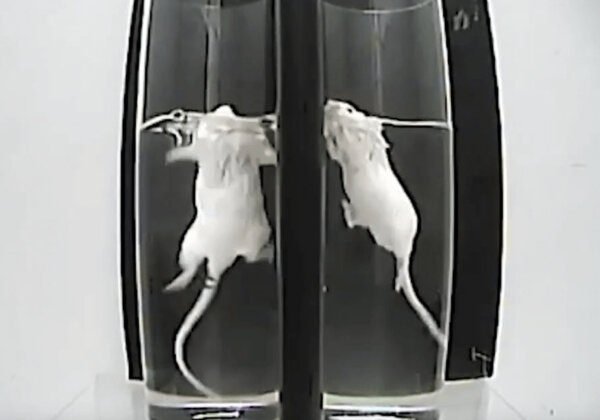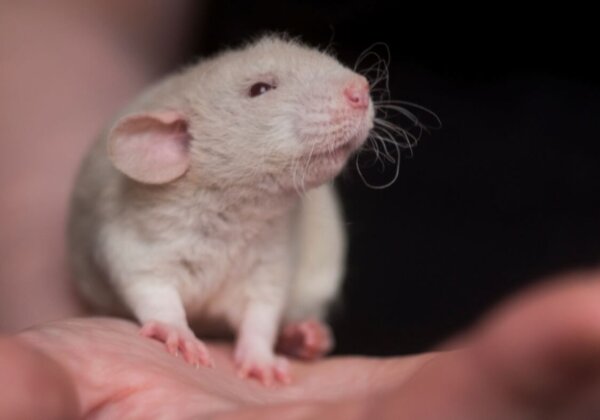NSW Government Has Again Failed Animals in Laboratories
Mice and other small animals have been condemned to continue to suffer and die in New South Wales laboratories following the state government’s decision not to ban the cruel forced swim test or smoking inhalation tests, despite expert recommendations to do so.

Government Ignores Cruelty Findings
In 2021, three baboons escaped from a laboratory in Sydney, sparking a parliamentary committee inquiry into the use of primates and other animals in medical research, which saw experts give testimony about animal suffering and deaths in labs.
The committee, chaired by Greg Donnelly of the Labor Party and Emma Hurst of the Animal Justice Party, considered what it called “absolutely shocking evidence” about animal use in laboratories in universities and medical research facilities across the state and recommended the rapid phase-out of two types of tests in particular: the forced swim test and smoking tower tests.
Sadly, leaders have ignored this recommendation and no immediate action is being taken. The Department of Primary Industries merely announced in a statement that the New South Wales government would “carefully consider” the recommendation.
The Forced Swim Test Terrifies Small Animals
Popularised in the 1970s, the forced swim test (also known as “the despair test”) was supposedly designed to gauge the antidepressant quality of drugs, but since then the initial interpretation of the test has been widely criticised by scientists.
In this physically and psychologically damaging test, small animals such as mice are placed into beakers of water. They panic and try to escape by attempting to climb up the sides of the beakers or even diving underwater in search of an exit. They paddle furiously, desperately trying to keep their heads above water, until eventually they start to float.
Experimenters assumed that animals who give up swimming and spend more time floating are depressed, but experts later reasoned that floating is more likely to be an indication that animals are learning, conserving energy, and adapting to a new environment.
The test has been condemned as pointless and cruel by many experts, and an analysis of data from 15 major pharmaceutical companies shows that the forced swim test is not successful in determining whether a substance would be effective in treating human depression.
Smoking Tests Kill
Smoking kills. It’s a fact so widely known that it’s even been stated on the front of Australian cigarette packages since 1995. Nonetheless, animals are still forced to inhale smoke in Australian laboratories.
One method of forcing mice and rats to inhale smoke – highlighted during the inquiry – is via a “smoking tower”, an apparatus wherein dozens of mice at a time are held in small tubes with their noses inserted into holes in an upright centre tube and through which smoke flows. This test is designed to induce lung disease, and it subjects mice to up to 18 weeks of cigarette smoke exposure.
During the inquiry, the committee heard that between April 2018 and June 2020 at just one university, there were a “significant” number of animal deaths – 102 to be precise, with 73 of them directly related to smoking towers. Asphyxiation was the primary cause of death, but animals can also suffocate or, if they wet themselves, die of hypothermia.

The Use of Animals in Australian Laboratories Is Shrouded in Mystery
The exact number of animals exploited in Australian labs is unknown, because reporting is scarce. Australia does not maintain a national system to collate statistics concerning animal use, and states are not obliged to report, meaning there’s no way for the public to know just how many animals are secretly suffering.
Based on the spotty reporting that is accessible, however, more than 10 million animals are languishing in labs in any given year.
Animal Testing Harms Humans, Too
In addition to being extremely cruel, experimenting on animals is bad science.
The National Institutes of Health in the US notes that a novel drug can take 10 to 15 years and more than $2 billion to develop, and failure rates occur in about 95% of human studies. Clearly, there is a problem with the current paradigm for developing and testing drugs and getting them to market, and experiments on animals have been identified as one of the contributing factors. Preclinical trials and drug development aren’t the only problem areas – 90% of basic research, most of which involves animals, ultimately fails to lead to human treatments, despite the considerable investment involved in breeding, feeding, housing, and, eventually, disposing of animals.
Simply put, using animals in experiments is as costly as it’s callous – and is ultimately pointless.

What You Can Do
As long as the New South Wales government continues to allow the exploitation of animals in labs, the blood of hundreds of thousands of animals will be on its hands. But you can help!
- Speak out against the forced swim test. This cruel and unnecessary experiment is still being used by universities in Australia and New Zealand. While you’re at it, please sign our petition urging the Australian government and national research councils to implement a policy that mandates an end to animal experimentation and provides a clear strategy and timeline for achieving this goal.
- Buy only cruelty-free products. If you aren’t sure whether your favourite brands drip chemicals into rabbits’ eyes, check out PETA US’ Global Beauty Without Bunnies
- Adopt an animal rescued from a laboratory. Organisations such as the Liberty Foundation Australia make it possible for compassionate people to take advantage of “right to release” laws so that they can adopt animals formerly used in laboratories (who would otherwise be killed). From mice and guinea pigs to dogs and cats, these animals are waiting for loving homes.







